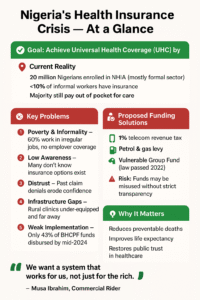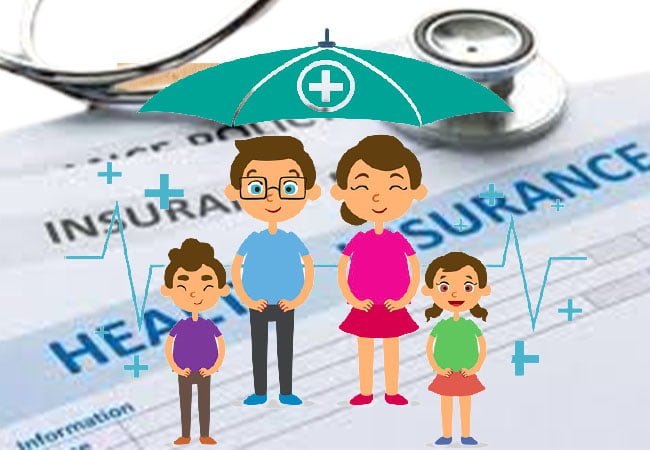ABUJA, Nigeria – On a humid afternoon in Gwagwalada, Musa Ibrahim wipes sweat from his forehead as he recounts the day he sold his only motorcycle. The sale wasn’t for business expansion or family celebration—it was to pay for his wife’s emergency surgery. Dennis Gabriel writes.
“I don’t have any health insurance,” says the 39-year-old commercial rider. “We rely on prayers and small savings. When sickness comes, we suffer.”
Musa’s story echoes across Nigeria—a country of over 200 million people where health insurance is still a privilege for a select few. For millions of ordinary citizens, the dream of affordable healthcare remains distant, buried under economic hardship, broken policy promises, and systemic neglect.
A National Goal Lost in the Numbers
Nigeria has pledged to achieve Universal Health Coverage (UHC) by 2030, in line with the United Nations Sustainable Development Goal (SDGs) 3.8. Yet, progress is painfully slow. The absence of reliable demographic data further clouds the path forward—the country has not conducted a national census since 2006.
Population estimates vary wildly between 218 million and 300 million, making health policy planning less science and more guesswork.
While the National Health Insurance Authority (NHIA) celebrated expanding enrolment to 20 million Nigerians by June 2025—up from 16.8 million in 2023—coverage is still skewed. Formal sector workers, especially civil servants, benefit the most, while informal workers, rural dwellers, and the vulnerable majority are left behind.
The 2024 NHIA Progress Report reveals that less than 10% of informal sector workers are covered. For many, insurance is viewed as a risky gamble in a country where public trust in governance is low.
Poverty, Distrust, and Infrastructure Gaps
The barriers to widespread health insurance in Nigeria are deep-rooted:
Poverty and Informality: Over 60% of Nigerians work in the informal economy, earning irregular incomes and lacking employer-sponsored schemes.
Low Awareness: Many citizens are unaware of insurance benefits due to poor public sensitisation.
Distrust in the System: Past cases of denied claims and poor service delivery fuel scepticism.
Weak Infrastructure: In rural areas, insured citizens may still live hours away from under-equipped clinics.

Policy Ambitions, Slow Implementation
The Basic Health Care Provision Fund (BHCPF)—designed to subsidise care—disbursed only 43% of its allocated funds by mid-2024, limiting its reach.
Proposals to fund insurance via 1% of telecom revenue or a share of gas sales remain trapped in bureaucratic limbo. Without clear timelines and transparent execution, citizens see these initiatives as yet another set of unfulfilled promises.
The Vulnerable Group Fund: Promise and Pitfalls
On May 24, 2022, former President Muhammadu Buhari signed the National Health Insurance Authority Bill 2021 into law, creating a Vulnerable Group Fund to cover the cost of insurance for Nigeria’s poorest citizens.
Under Section 26, subsection 1c, the fund’s revenue sources include a telecommunications tax of at least one kobo per second on GSM calls.
While it sounded promising, experts were cautious. Prof. Oyewale Tomori, a leading virologist, warned: “It is not the taxation that is the matter, but ensuring that the proceeds are used for the intended purpose. Otherwise, it’s just sweet icing on a rotten cake.”
Similar proposals—a 1% tax on petrol and gas—have faced the same fate: promising on paper, stagnant in practice.
A System Failing the People
The irony is glaring. Politicians enjoy free or heavily subsidised healthcare, yet the poor—whom these schemes are meant to protect—pay out of pocket, self-medicate, or die when they cannot afford care.
For many Nigerians, the choice is brutal: Borrow heavily or sell assets to fund treatment, resort to herbal remedies and prayers, and delay treatment until it’s too late.
Expert Recommendations for Change
Public health experts agree that Nigeria can still reverse course by: Subsidising premiums for low-income earners via community-based insurance, launching aggressive awareness campaigns to demystify health insurance strictly enforcing the NHIA Act with transparent claims processing, partnering with private providers and fintechs to offer micro-insurance via mobile phones, and conducting a credible national census to anchor realistic healthcare planning.
A Human Right, Not a Privilege
Access to healthcare is a human right, not a luxury for the urban elite. Africa Health Report calls for revisiting stalled policies—including the proposed taxes on petrol, gas, and calls—to fund insurance for the vulnerable. Such measures, if implemented transparently, could: reduce preventable deaths, improve life expectancy and restore public trust in governance.
As Prof. Tomori and others have stressed, checks and balances must ensure these funds are not siphoned away but channelled to their intended beneficiaries.
Musa Ibrahim’s plea captures the heart of the crisis: “We want a system that works for us, not just for the rich or people in Abuja and Lagos. Just something small that can help us sleep better at night when someone falls sick.”
Until that happens, millions of Nigerians remain just one illness away from financial ruin.



